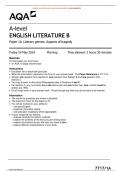MERGED QUESTION PAPER> MARK SCHEME>INSERT> 100% GUARANTEE
A-level
ENGLISH LITERATURE B
Paper 1A Literary genres: Aspects of tragedy
Friday 24 May 2024 Morning Time allowed: 2 hours 30 minutes
Materials
For this paper you must have:
• an AQA 12-page answer book.
Instructions
• Use black ink or black ball-point pen.
• Write the information required on the front of your answer book. The Paper Reference is 7717/1A.
• Answer one question from Section A, one question from Section B and one question from
Section C.
• You may answer on the same Shakespeare play in Sections A and B.
• For Section C, you must write about one drama text and one further text, one of which must be
written pre-1900.
• Do all rough work in your answer book. Cross through any work you do not want to be marked.
Information
• The marks for questions are shown in brackets.
• The maximum mark for this paper is 75.
• You will be marked on your ability to:
– use good English
– organise information clearly
– use specialist vocabulary where appropriate.
• In your response you need to:
– analyse carefully the writers’ methods
– explore the contexts of the texts you are writing about
– explore connections across the texts you have studied
– explore different interpretations of your texts.
IB/G/Jun24/G4007/E3 7717/1A
, 2
Section A
Answer one question in this section.
Either
0 1 Othello – William Shakespeare
Read the extract below and then answer the question.
Explore the significance of this extract in relation to the tragedy of the play as a whole.
Remember to include in your answer relevant analysis of Shakespeare’s dramatic
methods.
[25 marks]
DESDEMONA
’Tis meet I should be used so, very meet.
How have I been behaved, that he might stick
The smallest opinion on my least misuse?
Enter Emilia and Iago
IAGO
What is your pleasure, madam? How is’t with you?
DESDEMONA
I cannot tell: those that do teach young babes
Do it with gentle means and easy tasks:
He might have chid me so, for, in good faith,
I am a child to chiding.
IAGO What is the matter, lady?
EMILIA
Alas, Iago, my lord hath so bewhored her,
Thrown such despite and heavy terms upon her
As true heart cannot bear.
DESDEMONA
Am I that name, Iago?
IAGO What name, fair lady?
DESDEMONA
Such as she said my lord did say I was.
EMILIA
He called her whore: a beggar in his drink
Could not have laid such terms upon his callet.
IAGO
Why did he so?
DESDEMONA
I do not know: I am sure I am none such.
IAGO
Do not weep, do not weep. Alas the day!
EMILIA
Hath she forsook so many noble matches,
Her father, and her country, all her friends,
To be called whore? Would it not make one weep?
IB/G/Jun24/7717/1A
, 3
DESDEMONA
It is my wretched fortune.
IAGO Beshrew him for’t!
How comes this trick upon him?
DESDEMONA Nay, heaven doth know.
EMILIA
I will be hanged if some eternal villain,
Some busy and insinuating rogue,
Some cogging, cozening slave, to get some office,
Have not devised this slander; I’ll be hanged else.
IAGO
Fie, there is no such man! It is impossible.
DESDEMONA
If any such there be, heaven pardon him.
EMILIA
A halter pardon him and hell gnaw his bones!
Why should he call her whore? Who keeps her company?
What place, what time, what form, what likelihood?
The Moor’s abused by some most villainous knave,
Some base notorious knave, some scurvy fellow.
O heaven, that such companions thou’dst unfold,
And put in every honest hand a whip
To lash the rascals naked through the world,
Even from the east to th’west!
IAGO Speak within door.
EMILIA
O fie upon them! Some such squire he was
That turned your wit the seamy side without
And made you to suspect me with the Moor.
(Act 4, Scene 2)
Turn over for the next question
Turn over ►
IB/G/Jun24/7717/1A
, 4
or
0 2 King Lear – William Shakespeare
Read the extract below and then answer the question.
Explore the significance of this extract in relation to the tragedy of the play as a whole.
Remember to include in your answer relevant analysis of Shakespeare’s dramatic
methods.
[25 marks]
(Act 1, Scene 3)
Enter Gonerill and Oswald, her steward
GONERILL Did my father strike my gentleman for chiding
of his Fool?
OSWARD Ay, madam.
GONERILL
By day and night he wrongs me; every hour
He flashes into one gross crime or other
That sets us all at odds. I’ll not endure it!
His knights grow riotous, and himself upbraids us
On every trifle. When he returns from hunting
I will not speak with him. Say I am sick.
If you come slack of former services
You shall do well; the fault of it I’ll answer.
OSWARD He’s coming, madam; I hear him.
GONERILL
Put on what weary negligence you please,
You and your fellows. I’d have it come to question.
If he distaste it let him to my sister,
Whose mind and mine I know in that are one,
Not to be overruled. Idle old man,
That still would manage those authorities
That he hath given away! Now, by my life,
Old fools are babes again, and must be used
With checks, as flatteries, when they are seen abused.
Remember what I have said.
OSWARD Well, madam.
GONERILL
And let his knights have colder looks among you.
What grows of it, no matter. Advise your fellows so.
I would breed from hence occasions, and I shall,
That I may speak. I’ll write straight to my sister
To hold my very course. Prepare for dinner. Exeunt
(Act 1, Scene 4)
Enter Kent in disguise
KENT
If but as well I other accents borrow
That can my speech diffuse, my good intent
May carry through itself to that full issue
For which I razed my likeness. Now, banished Kent,
IB/G/Jun24/7717/1A




